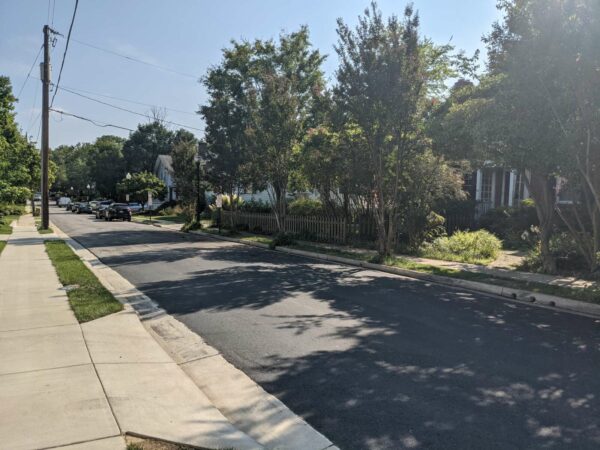
Abigail Brooks and her husband moved into their new home on N. Ivy Street, which was built in 2020, in April of this year.
Since then, she says they’ve been stuck in a Residential Permit Parking program quagmire. While they live on a street that is in an RPP zone, they have not been able to get their address approved for a permits, meaning the couple could get ticketed for parking on their own street.
“Our house was built along with two others and it is only ours that is not showing correctly for parking,” she said. “I have tried different forms, emails, calling, etc. and still cannot get this resolved.”
Brooks said she has also found some people with the same issues through the gym to which she and her husband belong.
“A couple of us did new construction at the same time so we’ve shared lessons learned, timelines, etc.,” she said.
In a months-long email back-and-forth with the parking team, provided to ARLnow, county staff repeatedly said the Brooks’ address is not eligible for the program. Even an attempt to get a county real estate appraiser to confirm her home’s assessment information and thus parking permit eligibility was unsuccessful.
But Department of Environmental Services spokesman Eric Balliet found that Brooks is correct: her home should be eligible.
“The resident is likely facing this issue because of a technical problem we’re experiencing that is preventing us from adding newly created addresses to our database,” he said. “This problem only affects newly created addresses… not existing addresses.”
The problem — affecting four households that the county knows of — was first identified in June 2021, but staff had a workaround in the database. That workaround stopped functioning in mid-July, Balliet said.
“We anticipate having the problem fixed by next week,” he said.
Until this issue is resolved, Balliet said residents can fill out a paper permit application and pay the permit fees in-person at county government headquarters. Staff will manually add the resident’s parking permit order to the system.
Brooks said it is unfortunate that she couldn’t get the same answer from the county.
“If they had responded and explained the issue, I would have understood and stopped bothering them for it to be fixed,” she said.
She praised other county functions for finding ways around the issue.
“Utilities, trash, recycling, etc. found workarounds for the issue we had with our address and personally ensured we got what we needed,” she said. “The real estate assessment team also were trying to be so helpful during the parking situation and we really appreciated how much they followed up with us to see if there is anything they could do to help resolve.”
Earlier this year, the county approved a number of changes to the Residential Permit Parking program. After considering paid, two-hour parking in RPP zones, the idea — which elicited public outcry — was nixed, but the program was expanded to make some multi-family properties, like apartment buildings, eligible.
Although the changes are in place, county staffers are still focused on renewing resident and landlord permits and passes for the 2021-2022 program year. They are still not processing petitions to establish new permit parking zones; the creation of new RPP zones has been frozen since the summer of 2017.
“We are finalizing updated petition procedures that incorporate changes the County Board adopted in February,” Balliet said. “We look forward to releasing those to the public in the coming weeks.”

